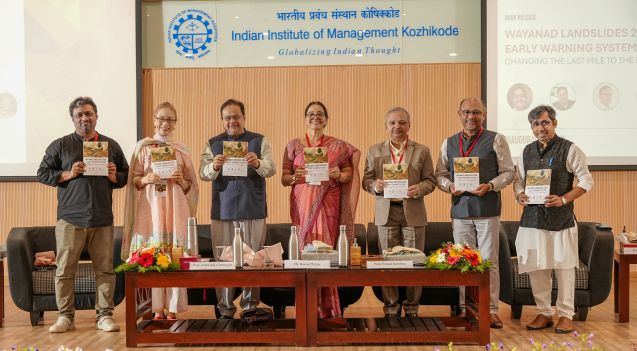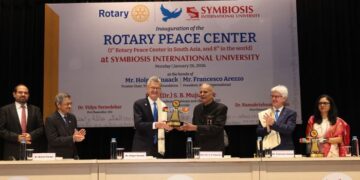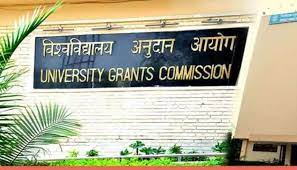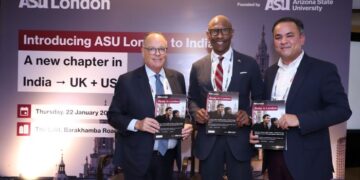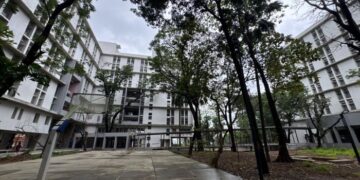The India-Japan Centre on Climate and Culture, at the Indian Institute of Management Kozhikode (IIMK) recently hosted a high-impact Workshop on Disaster Resilience and Climate Adaptation at the institute. The event brought together eminent academics, practitioners, and policymakers from India and Japan, united by a common goal: building resilient communities in the face of escalating climate risks.
The Workshop is a collaborative initiative between IIM Kozhikode, NIT Calicut, IIT Bombay, and Keio University, Japan, under the aegis of the India-Japan Centre on Climate and Culture at IIM Kozhikode. It served as a platform for deep cross-cultural and interdisciplinary dialogue on how people, policy, and practice can converge to strengthen disaster resilience in climate-vulnerable geographies.
Dr. Beena Philip, Hon’ble Mayor of Kozhikode, along with Prof. Debashis Chatterjee, Director, IIM Kozhikode, and Prof. Prasad Krishna, Director, NIT Calicut, inaugurated the Workshop. Also present where, Prof. Rajib Shaw (Keio University), Prof. Sakiko Kanbara (Kobe City College of Nursing), Prof. Anupam Das (IIM Kozhikode), Prof. Mohammed Firoz (NIT Calicut), Prof. Sajin Kumar KS (University of Kerala) and Prof. Shyni Anilkumar (NIT Calicut).
The speakers collectively emphasized a human-centric and culturally rooted approach to disaster preparedness, highlighting the intrinsic link between people, nature, and resilience.
Dr Beena Philip, shared her experience with the city of Kozhikode and how the administration is striving to strike a balance between development and sustainability taking into account a challenging future for the future generations. She added that “Students, younger generation are the ambassadors of the future and they will have to play a pivotal role in mitigating such enormous climatic challenges emerging out of ever-increasing anthropological interventions”.
Prof. Debashis Chatterjee underlined the importance of embedding early warning systems within the cultural and social fabric of communities. “We must move from reactive models to proactive, participatory ones — where disaster communication resonates not just as an alert, but as a lived, community-driven practice becoming part of an integral culture of resilience” he remarked.
Prof. Prasad Krishna added, “Nature is the most conservative ecosystem and responds adversely only to human interventions and anthropological misdeeds. People, policy and Practices with the right kind of monitoring and guidance can lead to a sustainable and resilient ecosystem helping manage disasters better.”
Focus on Wayanad Landslides 2024: Report Launch
A central highlight of the Workshop was the launch of a landmark study titled:
“Wayanad Landslides 2024: Early Warning System – Changing the Last Mile to the First Mile.” This comprehensive report, a collaborative output of the four partner institutions, is the result of rigorous fieldwork undertaken in Wayanad following the catastrophic landslide on July 30, 2024, which claimed over 400 lives and displaced nearly 7,000 people.
The study, led by Prof. Rajib Shaw of Keio University, offers critical insights into the vulnerabilities of Kerala’s fragile hill ecosystems and advocates for a reimagined early warning paradigm. It calls for embedding community participation at the core of resilience-building and policy design. The Team had also conducted field visits to Wayanad in January 2025
Key Themes and Deliberations
Discussions during the workshop revolved around:
- The correlation between climate, culture, and community risk perception
- The importance of early warning systems that go beyond technological alerts to include grassroots engagement and education
- Lessons from Japan’s experience in building robust disaster resilience systems
- The urgent need for multi-stakeholder coordination across institutions and levels of governance
- The emphasis on mass sensitisation and drills, particularly in the aftermath of recent disasters like the Wayanad landslide
Participants also stressed the need to strengthen local administrative capacities, invest in real-time monitoring infrastructure, and build trust through inclusive governance mechanisms.
Looking Ahead
The workshop concluded with a shared commitment to deepen Indo-Japanese academic and civic collaborations and replicate similar joint efforts in other ecologically sensitive regions. There was unanimous consensus that climate adaptation strategies must be deeply local yet globally informed — blending scientific rigor with community wisdom.


